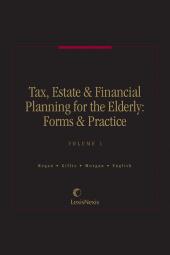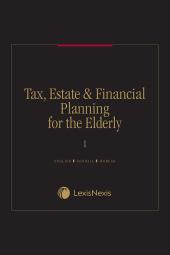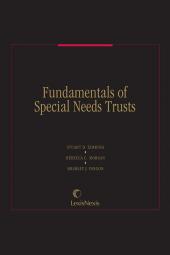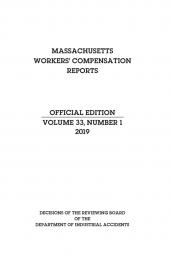Tax, Estate & Financial Planning for the Elderly: Forms & Practice
Select a format
 International Order Inquiry
International Order Inquiry
Select subscription type
Terms & conditions
Subscribers receive the product(s) listed on the Order Form and any Updates made available during the annual subscription period. Shipping and handling fees are not included in the annual price.
Subscribers are advised of the number of Updates that were made to the particular publication the prior year. The number of Updates may vary due to developments in the law and other publishing issues, but subscribers may use this as a rough estimate of future shipments. Subscribers may call Customer Support at 800-833-9844 for additional information.
Subscribers may cancel this subscription by: calling Customer Support at 800-833-9844; emailing customer.support@lexisnexis.com; or returning the invoice marked "CANCEL".
If subscribers cancel within 30 days after the product is ordered or received and return the product at their expense, then they will receive a full credit of the price for the annual subscription.
If subscribers cancel between 31 and 60 days after the invoice date and return the product at their expense, then they will receive a 5/6th credit of the price for the annual subscription. No credit will be given for cancellations more than 60 days after the invoice date. To receive any credit, subscriber must return all product(s) shipped during the year at their expense within the applicable cancellation period listed above.
The total price includes the product(s) listed in the Order Form and any Updates for a limited period (minimum period of 30 days) after the order is placed ("Order Window"). Shipping and handling fees are not included in the grand total price.
All shipments may be returned, at subscribers' expense, for full credit of the Price within 30 days of receipt.
Shipments may not be returned, and no credits will be issued, more than 30 days after receipt.
After the Order Window, subscribers will receive notice of Updates along with the then-current grand total price and order process as Updates become available. Subscribers will only be shipped those Updates they specifically request.
Product description
View a sample of this title using the ReadNow feature
The first and still the very best text on elder law, this outstanding volume covers every aspect of elder law practice. Topics covered include:
• Health (Medicare, Medicaid, advance health care directives, long-term care, nursing homes)
• Financial (income, estate and gift taxes, pensions, financial planning, estate planning, property management)
• Government Benefits (Social Security, SSI, veterans' benefits)
• Personal (housing, elder abuse, guardianship)
• Practical Advice for the Attorney (client relationships, ethical considerations)
Rely on expert legal analysis to explain all the significant issues and resolve the intricate problems that arise in this evolving area of practice. Professional guidance from top experts Rebecca C. Morgan, past President of the National Academy of Elder Law Attorneys, as well as Amos Goodall and David M. English, leading estate planning authorities, help you anticipate your clients' requirements and plan for their future. Every chapter begins with common client questions, followed by comprehensive legal analysis, including detailed planning notes, examples, and practical advice. This volume analyzes all relevant case law and legislation and explains the numerous and often complex administrative steps required to achieve the client's goals. The volume is national in scope, and includes state-specific discussions of significant deviations from the federal rules. Convenient cross-references to Tax, Estate & Financial Planning for the Elderly: Forms & Practice, the companion forms set, lead to sample forms and checklists for every practice need.
eBooks, CDs, downloadable content, and software purchases are noncancelable, nonrefundable and nonreturnable. Click here for more information about LexisNexis eBooks. The eBook versions of this title may feature links to Lexis+® for further legal research options. A valid subscription to Lexis+® is required to access this content.
Table of contents
Part A Managing the Elder Law Practice
Common Client Questions
A:1 Overview
A:2 Office Forms: Practicality and Consistency
A:3 Office Receptionist
A:4 New Client Information
A:5 Initial Client Contact
A:6 Capacity: The Threshold Question
A:7 Second Marriages
A:8 Estate Planning Questionnaire
A:9 Special Family Considerations
A:10 Representing Husband and Wife: Ethical and Practical Constraints
A:11 Representing Parent and Child: Special Issues
A:12 Fees and Retainer Agreement
A:13 Client Confidentiality and Consultation Follow-Up
A:14 Referral Checklist
A:15 The Required Calendaring System
A:16 Client Complaint and Satisfaction Form
Part B Building Your Practice
B:1 Begin With a Vision
B:2 Creating the Elder Law Office
B:3 Use of the Internet and Harnessing Technology
B:4 Establishing a Presence--The Art of Marketing
B:5 Retaining Clients and Building Client Relationships
Part C Social Security Benefits
Common Client Questions
C:1 Overview
C:2 The Groundwork for Handling a Social Security Case
C:3 Establishing Eligibility and Applying for Benefits
C:4 Amount of Benefits
C:5 Problems in Payment Procedures
C:6 Administrative Review
C:7 Judicial Review
C:8 Attorney's Fees
Part D Veterans' Benefits
Common Client Questions
D:1 Overview
D:2 Resources for Representing Veterans
D:3 General Requirements for Veterans' Benefits
D:4 Cash Benefits for Veterans
D:5 Benefits for Survivors
D:6 Health Care Benefits
D:7 Applying for Benefits
D:8 Appeals Process
Part E Private Pensions and IRAs
Common Client Questions
E:1 Overview
E:2 The Resources for Handling the Client's Case
E:3 Planning for Retirement
E:4 The Pension Rights of Spouses
E:5 Taxation of Pensions and Annuities
E:6 Losing Pension Benefits
E:7 Enforcing the Rights of a Plan Participant
E:8 Individual Retirement Accounts (IRAs)
Part F Income Tax Planning
Common Client Questions
F:1 Overview
F:2 Filing the Return and Paying the Tax
F:3 Exemptions
F:4 Income
F:5 Sale of a Residence: Rollover and Exclusion of Gain
F:6 Social Security Benefits
F:7 Deductions
F:8 Vacation Homes
F:9 Medical and Dental Expenses
F:10 Long-Term Care
F:11 Charitable Contributions
F:12 Qualified Residence Interest
F:13 Credit for the Elderly or the Disabled
F:14 Credit for Child and Dependent Care Expenses
Part G Medicare
Common Client Questions
G:1 Overview
G:2 The Resources for Handling a Medicare Case
G:3 Establishing Eligibility for Medicare
G:4 Financing Medicare Benefits
G:5 Covered Benefits
G:6 Claims and Payment Procedures
G:7 Appeals
G:8 COBRA Continuation Coverage in Employer's Health Insurance Plan
G:9 Medicare Supplemental Policies
G:10 Comparing Medicare Plans
G:11 Program of All-Inclusive Care for the Elderly (PACE)
Part H SSI Benefits
Common Client Questions with text references
H:1 Overview
H:2 The Resources for Handling an SSI Benefits Case
H:3 Establishing Entitlement to Benefits
H:4 Applying for Benefits
H:5 Amount of Benefits
H:6 Strategies for Establishing Financial Eligibility
H:7 Procedures After Payments Begin
H:8 The State Supplementary Payment
H:9 The Appeals Process
Part I Medicaid
Common Client Questions
I:1 Overview
I:2 Basics for Handling Medicaid Planning
I:3 Client Care Needs and Perceptions
I:4 Gathering the Necessary Information
I:5 Planning for Medicaid Eligibility
I:6 Asset Preservation Planning Strategies
I:7 Convert Nonexempt Resources to Exempt
I:8 Community Spouse's Refusal to Spend Down Resources
I:9 Transfer of Assets
I:10 Pensions and Annuities
I:11 Increase Minimum Resource or Income Level: Court Order or Fair Hearing
I:12 Creation of Miller Trusts and Other Income Cap State Strategies
I:13 Divorce
I:14 Establish Intent to Return Home
I:15 Inheritance by an Institutionalized Spouse
I:16 Long-Term Care Insurance
I:17 Strategies for Single Persons
I:18 Asset Preservation: Living Trust
I:19 Asset Preservation: Special Needs Trust
I:20 Trusts and Medicaid Planning
I:21 Court Proceedings to Transfer Assets
I:22 Voluntary Guardianship or Conservatorship
I:23 How to Represent a Client in a Medicaid Application
I:24 The Fair Hearing
I:25 Liens and Recovery From Estate
APPENDIX 1 State Medicaid Manual, HCFA Transmittal No. 63 September 1994
State Medicaid Manual, HCFA Transmittal No. 63 September 1994
3810 Medicaid Estate Recoveries
APPENDIX 2 State Medicaid Manual, HCFA Transmittal No. 64
State Medicaid Manual, HCFA Transmittal No. 64
3257 Transfers Of Assets And Treatment Of Trusts
3258 Transfers Of Assets For Less Than Fair Market Value
3258.1 General--
3258.2 Effective Date.--
3258.3 Individuals To Whom Transfer of Assets Provisions Apply.--
3258.4 Look-back Date and Look-Back Period.--
3258.5 Penalty Periods.--
3258.6 Treatment Of Income As Asset.--
3258.7 Treatment Of Jointly Owned Assets.--
3258.8 Penalties for Transfers of Assets for Less Than Fair Market Value.--
3258.9 Treatment of Certain Kinds of Transfers for Less Than Fair Market Value.--
3258.10 Exceptions to Application of Transfer of Of Assets Penalties.--
3258.11 Transfers of Assets and Spousal Impoverishment Provisions.--
3259 Treatment Of Trusts
3259.1 General.--
3259.2 Effective Date.--
3259.3 Individuals to Whom Trust Provisions Apply.--
3259.4 Individual's Assets Form Only Part of Trust.--
3259.5 Application of Trust Provisions.--
3259.6 Treatment of Trusts.--
3259.7 Exceptions to Treatment of Trusts Under Trust Provisions.--
3259.8 Application of Trust Provisions Would Work Undue Hardship.--
Part J Planning for Disability and Incapacity
Common Client Questions
J:1 Overview
J:2 Capacity to Execute Specific Documents
J:3 Durable Power of Attorney
J:4 Durable Power of Attorney: Effective Immediately or Upon Incapacity
J:5 Durable Power of Attorney: General Powers Conferred
J:6 Selected Powers for Durable Power of Attorney
J:7 Powers Not Granted by Durable Power of Attorney
J:8 Durable Power of Attorney: Third Party Reliance
J:9 Revocation and Amendment of Durable Power of Attorney
J:10 General Administrative Provisions in Durable Power of Attorney
J:11 Durable Power of Attorney: Nomination of Conservator/Guardian and Successor Attorney-in-Fact
J:12 Provisions Relating to the Effectiveness of the Durable Power of Attorney
J:13 Choice of Attorney-in-Fact
J:14 Durable Power of Attorney: Effectiveness Problems
J:15 Abuse of Durable Power of Attorney
J:16 Duties and Responsibilities of Attorney-in-Fact
J:17 Internal Revenue Service Durable Power of Attorney
J:18 Durable Power of Attorney and Guardianship/Conservatorship Proceedings
J:19 Termination
J:20 Durable Power of Attorney Needed Even If Revocable Living Trust
J:21 Joint Tenancy
Part K Health Care Decisions
Common Client Questions
K:1 Overview
K:2 Client Concerns
K:3 Responsibility of the Practitioner
K:4 Key Participants in Health Care Decision-Making
K:5 The Right to Refuse Treatment
K:6 Preventive Planning: Drafting Health Care Documents
K:7 Sample Clauses
K:8 Selected Problems in Enforcing Written Health Care Documents
K:9 Decision-Making for the Incompetent Patient Where No Documents Exist
K:10 Special Issues in Health Care Decision-Making
K:11 Organ and Tissue Donation
K:12 A Right to "Futile" Medical Treatment?
Part L Guardianship and Conservatorship
Common Client Questions
L:1 Overview: The Concept and the Need
L:2 Obtaining Appropriate, Practical Information
L:3 When Guardianship or Conservatorship May Be Needed
L:4 When Guardianship or Conservatorship May Not Be Appropriate
L:5 Central Role and Effective Use of Medical Testimony
L:6 Facts and Circumstances of Greatest Relevance to Petition
L:7 Alternatives to Guardianship/Conservatorship
L:8 Choice of Guardian/Conservator
L:9 Ethical Issues and Conflicts of Interest
L:10 Attorney Responsibility to Non-Client Ward
L:11 Attorney Fees
L:12 Powers of the Guardian/Conservator
L:13 Powers Not Granted to the Guardian/Conservator: Powers Retained by the Ward
L:14 Initiating the Guardianship/Conservatorship Process
L:15 Emergency Guardianships/Conservatorships
L:16 Special Order or Proceedings to Allow Psychotropic Drugs, Electro-Convulsive Therapy (ECT), and Placement in ...
L:17 Uncontested Court Hearings
L:18 Contested Court Hearings
L:18A Contested Court Hearings: Representing the Petitioner Seeking to Establish a Guardianship or Conservatorship
L:19 Opposing Guardianship/Conservatorship Petition; Representation of Alleged Incapacitated Person
L:20 Management and Other Responsibilities of the Guardian/Conservator
L:21 Court Monitoring
L:22 Termination of Guardianship/Conservatorship
Part M Securing Services
Common Client Questions
M:1 Overview
M:2 Securing In-Home and Other Personal Support Services
M:3 Professional Resources and Referrals
M:4 Other Key National and Regional Resources--Checklists
M:5 Health Care Oversight at the Local Level
M:6 Case Study--A Referral Model for the Practitioner
Part N Housing Choices
Common Client Questions
N:1 Overview
N:2 Option #1: Staying at Home for Client's Lifetime
N:3 Option #2: Sale of Current Home and Purchase of Another
N:4 Option #3: Purchase of a Home
N:5 Option #4: Month to Month Rental
N:6 Option #5: Long-Term Care in Nursing Facility
N:7 Lifetime, Life-Care, or Continuing Care Contracts
Part O Estate Planning and Living Trusts
Common Client Questions
O:1 Overview
O:2 Uses of Living Trusts
O:3 Benefits of a Living Trust: Management in the Event of Incapacity
O:4 Benefits of a Living Trust: Avoidance of Probate
O:5 Disadvantages of a Living Trust
O:6 Choice of Trustee
O:7 Living Trust Agreement
O:8 Funding a Living Trust
O:9 Community Property
O:10 Drafting the Will
O:11 Use of Disclaimers
O:12 Large Estate Planning
Part P Elder Abuse
Common Client Questions
P:1 Overview
P:2 What Is Elder Abuse, Neglect and Exploitation?
P:3 The Victim and the Abuser
P:4 Signs of Elder Abuse
P:5 Considerations for the Attorney
P:6 Elder Abuse Statutes
P:7 Adult Protective Services
P:8 Social Services and Other Agencies
Part Q Nursing Homes
Common Client Questions
Q:1 Overview
Q:2 Medicare and Medicaid Covered Services
Q:3 Resident Assessment and Care Plans
Q:4 Choosing a Nursing Home
Q:5 Prohibited Practices
Q:6 Residents' Rights
Q:7 Duties of Facility
Q:8 Transfers and Discharges
Q:9 Americans with Disabilities Act
Q:10 Litigation
Q:11 Where to Get Help
Part R Ethical Issues in an Elder Law Practice
Common Client Questions
R:1 Overview
R:2 Who is the Client?
R:3 Conflicts of Interest
R:4 Confidentiality
R:5 Multiple Clients
R:6 Clients Who Have Diminished Capacity
R:7 Training Employees
R:8 Suggestions for Handling Ethical Issues in an Elder Law Practice
 Lexis Nexis
Lexis Nexis 





